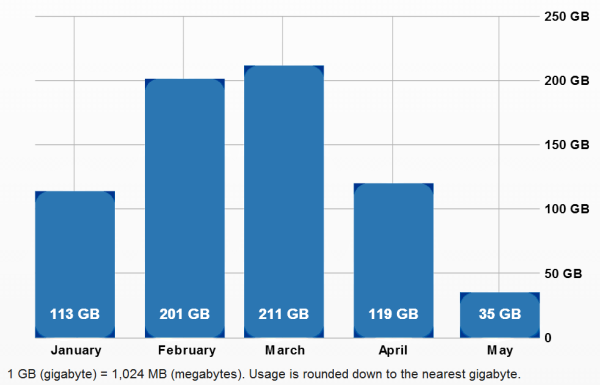aNewDomain.net — David Cohen, the executive VP of Comcast, recently claimed that over the next five years all its Internet subscribers would have data caps.
To put weight behind that statement, Comcast has actually been experimenting with monthly 300GB data caps in targeted markets. Fact is, Cohen mentioned 300GB and 500GB data cap scenarios.
Personal Usage
My ISP happens to be Time Warner Cable (TWC), which Comcast is now attempting to acquire. So, in light of Cohen’s statement above, the data cap potentially applies to me. Yikes. My colleagues and I discussed this notion and its effects on our popular YATS podcast. How much up and down data do we use on average, we pondered, and how much would it cost if we had to deal with this data cap?
Here’s my TWC data usage for the last couple of months below:

Image credit: Larry Press
We see a good deal of variance over these months, but even at its peak my usage is well under 300GB in a month. But the above is a specific case. As a cord cutter, we’ve got a whole different story. In this role, I use more data than a typical user, even though my household only has two people and neither of us stream movies or music very often.
But if we had more people at home and were streaming heavy content — that’s more typical, of course, for families with teenagers and other heavy-media watchers — we’d break the 300GB limit for sure. And as the quality of videos increases and content becomes more easily available, we would all use more data. The 500GB limit, in a couple years, will be easy to pass beyond.
That’s why the Comcast data caps depress me. Stop and think for a moment how they’d affect you.
Global Numbers
Thanks to Sandvine, which tracks global Internet traffic patterns, we can get a better idea of the median and means of monthly Internet data consumption. Find the full Global Internet Phenomena Report for the first quarter of 2014 here. Below, check out the chart I pulled from it. These are the North American stats.

Image credit: Sandvine
At first look, the chart shows everyone hits far below the 300GB data cap. But wait.
When Sandvine broke up categories of users into cord cutters, typical subscribers and non-streamers, you’ve got a different story.

Image credit: Sandvine
There are relatively few cord cutters today, but we’re a dedicated and growing group. Everyone is transitioning now to IPTV. The distinction between “TV” and “the Internet” is broken — and the current models won’t last much longer.
By Sandvine’s estimates, cord cutters are averaging over 200GB a month today. That’s the average.
So ask yourself: Where will cordcutter data use be in, say, five years? Video resolution will likely be a lot higher then — and there will be more video material of all kinds across the board. Now you see the problem.
Comcast Monopoly?
As it is, Comcast will adjust its pricing to maintain or increase revenue during this transition period.
Comcast will be able to do that because it is a content provider as well as an ISP. That means it will be able to discriminate in favor of its own content, which it could improve over time from its current lackluster offering.
Further, Comcast is getting bigger and bigger. It will be able to extract increasing delivery fees from its content-provision competitors.
If you are not sufficiently depressed by this picture, let me point out that Comcast and its merger target TWC were the lowest ranked companies on the American Consumer Satisfaction Index for the first quarter of 2014, and Internet service was the lowest-ranked industry.
Don’t get me wrong. I don’t oppose the general idea behind Comcast data caps or any usage-based billing per se. It would provide an answer to the ISP’s claim that network neutrality is bad because it rewards bandwidth hogs.
And I would be happy to be billed by the gigabyte. But that’s only acceptable if there was true ISP competition. Competition drives cost down and quality up. If I could easily switch between several fast, reliable ISPs — as my son who lives in Korea can — I could vote with my dollars. So could you. And you’d have options that didn’t set prices at all.
Sadly, this isn’t the case in the U.S. now. If you don’t like what’s going on with Comcast data caps, my advice is to contact the company over Google+ and cc +aNewDomain and +Larry Press with your comments. Together, we have a lot of voices — and though competition looks depressing in the ISP world, it’s still our constitutional right to complain.
For aNewDomain.net, I’m Larry Press.
Based in Los Angeles, Larry Press is a founding senior editor covering tech here at aNewDomain.net. He’s also a professor of information systems at California State University at Dominguez Hills. Check his Google+ profile — he’s at +Larry Press — or email him at Larry@aNewDomain.net.













“Net Neutrality” is a sham being pushed by Comcast and perhaps even NetFlix so we all end up with metered internet! This isnt going to be good for ANYBODY especially us cord cutters.